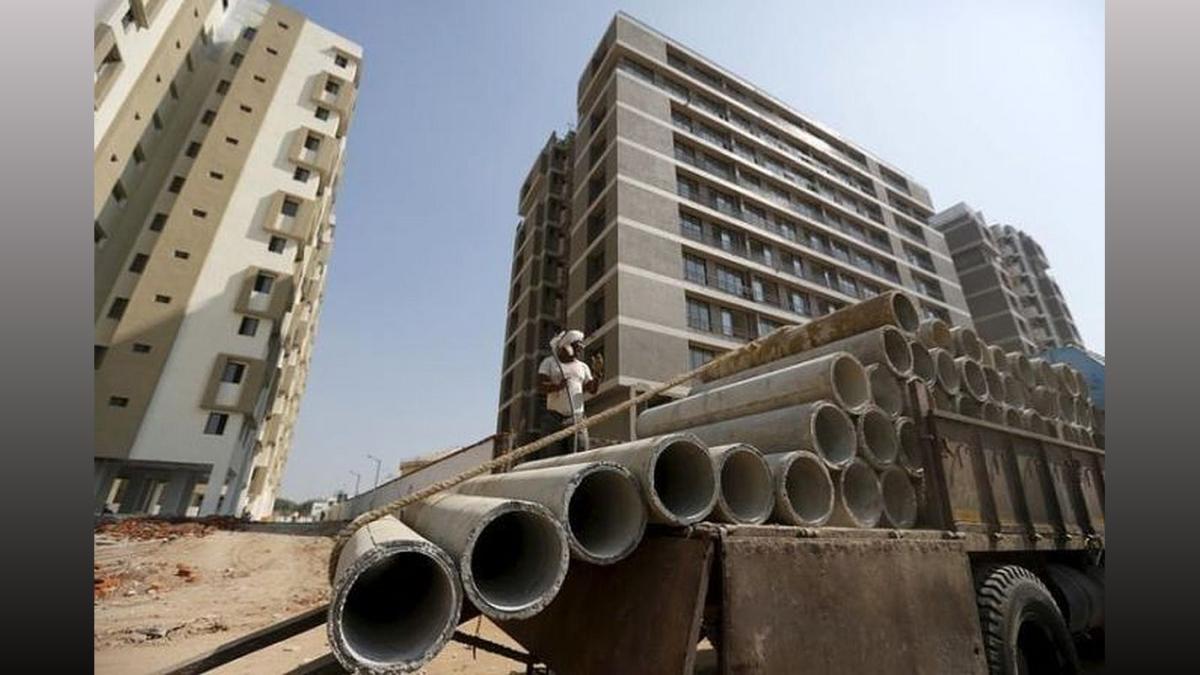Mortgage Rates Impact Homebuying: FICCI-Anarock Survey
FICCI-Anarock survey reveals 90% of homebuyers will be impacted by mortgage rates exceeding 9%. Read about key findings on real estate investment trends, preferred budget ranges, and top homebuyer demands.

Photograph: Amit Dave/Reuters
Mumbai, Oct 18 (PTI) Nearly 90 per cent of respondents feel that their decision to buy residential properties will be significantly impacted if mortgage rates exceed 9 per cent, according to a survey conducted by FICCI and Anarock.
Industry body FICCI and real estate consultant Anarock on Friday released their joint 'Homebuyer Sentiment Survey', with a sample size of 7,615 people, at a real estate conference here.
"In a recent survey, over 71 per cent of respondents indicated that their home-buying decisions would remain unaffected if rates stay below 8.5 per cent. However, if rates exceed 9 per cent, then it will have a significant impact on over 87 per cent of respondents. For rates between 8.5 per cent and 9 per cent, about 54 per cent expect a moderate influence on their choice," the report said.
Among other findings, the survey found that real estate is the most preferred asset class for investment for over 59 per cent of respondents.
The Indian residential market continues to be predominantly driven by end-users, with over 67 per cent of survey participants buying properties for self-use.
The survey revealed that the budget range of Rs 45-90 lakh continues to be the most favoured option for over 35 per cent of prospective homebuyers. Currently, over 28 per cent of survey respondents stated their preference for homes priced between Rs 90 lakh and Rs 1.5 crore.
Top homebuyer demands are timely project completion (98 per cent), improved construction quality (93 per cent), and well-ventilated homes (72 per cent).
Addressing a FIICI event, Pramod Rao, Executive Director, SEBI, underscored the importance of regulatory frameworks in driving sustainable growth in the real estate sector.
"Investor confidence is vital for the industry's long-term success, and SEBI's focus on transparency and governance has been key in building this trust," Rao said, according to a FICCI statement.
Rao emphasised that strong compliance and better disclosures will be crucial in attracting institutional investments.
He also highlighted SEBI's initiatives, including a single dashboard data bank to streamline processes and efforts to convert real estate investments into tradable financial instruments, boosting liquidity and accessibility.
Sandip Somany, Past President, FICCI and Mentor, FICCI Committee on Urban Development and Real Estate, and CMD, Somany Impresa Group, said, "The Indian real estate sector has shown remarkable evolution. The significant shift in consumer preferences away from ready-to-move homes towards under-construction properties indicates growing confidence in developers and the regulatory environment."
This trend reflects a maturing market and the positive impact of regulatory measures like RERA, he added.
Raj Menda, Chairman, FICCI Committee on Urban Development and Real Estate and Chairman of the Supervisory Board, RMZ Corporation, said, "India's economic growth is driving rapid expansion in the real estate sector, with the residential market projected to reach USD 1.04 trillion by 2029, growing at a 25.6 per cent CAGR. This growth is fuelled by rising demand for ultra-luxury properties and significant investments."
The commercial real estate sector is also thriving, supported by 1,600 Global Capability Centers and emerging secondary markets, Menda said.
Anarock Chairman Anuj Puri said the consumer sentiment survey is timely and important, as it gauges contemporary homebuyers' preferences in the current market environment and highlights currently significant trends in Indian residential real estate.
Sanjay Dutt, Managing Director and CEO of Tata Realty and Infrastructure, highlighted the significant evolution of the real estate sector, particularly with the shift from traditional REITs to smaller-scale REITs (SM REITs).
He emphasised the advantages of fractional ownership, noting how it allows investors to access high-quality assets with lower capital commitments, democratising real estate investment.
Gaurav Pandey, Co-Chairman of the FICCI Committee on Urban Development and Real Estate and Managing Director and CEO of Godrej Properties, stated, "Institutional investors are increasingly focused on wealth creation through the development of better-quality products in the real estate sector."
He highlighted the distinct growth stories of various cities, noting that Pune stands out as a frontrunner in this regard.
Pandey emphasised that sustainability has become a critical priority for all large developers, reflecting a collective commitment to responsible and eco-friendly practices that will shape the industry's future."
In his address, Vipul Roongta, Co-Chairman of the FICCI Committee on Urban Development and Real Estate and Managing Director and CEO of HDFC Capital Advisors Ltd emphasized on the critical importance of investing in skilled labour and workforce development to drive progress.
Additionally, Roongta underscored the essential role of the private sector in creating impactful, scalable solutions to meet the growing demand in the industry.
Industry body FICCI and real estate consultant Anarock on Friday released their joint 'Homebuyer Sentiment Survey', with a sample size of 7,615 people, at a real estate conference here.
"In a recent survey, over 71 per cent of respondents indicated that their home-buying decisions would remain unaffected if rates stay below 8.5 per cent. However, if rates exceed 9 per cent, then it will have a significant impact on over 87 per cent of respondents. For rates between 8.5 per cent and 9 per cent, about 54 per cent expect a moderate influence on their choice," the report said.
Among other findings, the survey found that real estate is the most preferred asset class for investment for over 59 per cent of respondents.
The Indian residential market continues to be predominantly driven by end-users, with over 67 per cent of survey participants buying properties for self-use.
The survey revealed that the budget range of Rs 45-90 lakh continues to be the most favoured option for over 35 per cent of prospective homebuyers. Currently, over 28 per cent of survey respondents stated their preference for homes priced between Rs 90 lakh and Rs 1.5 crore.
Top homebuyer demands are timely project completion (98 per cent), improved construction quality (93 per cent), and well-ventilated homes (72 per cent).
Addressing a FIICI event, Pramod Rao, Executive Director, SEBI, underscored the importance of regulatory frameworks in driving sustainable growth in the real estate sector.
"Investor confidence is vital for the industry's long-term success, and SEBI's focus on transparency and governance has been key in building this trust," Rao said, according to a FICCI statement.
Rao emphasised that strong compliance and better disclosures will be crucial in attracting institutional investments.
He also highlighted SEBI's initiatives, including a single dashboard data bank to streamline processes and efforts to convert real estate investments into tradable financial instruments, boosting liquidity and accessibility.
Sandip Somany, Past President, FICCI and Mentor, FICCI Committee on Urban Development and Real Estate, and CMD, Somany Impresa Group, said, "The Indian real estate sector has shown remarkable evolution. The significant shift in consumer preferences away from ready-to-move homes towards under-construction properties indicates growing confidence in developers and the regulatory environment."
This trend reflects a maturing market and the positive impact of regulatory measures like RERA, he added.
Raj Menda, Chairman, FICCI Committee on Urban Development and Real Estate and Chairman of the Supervisory Board, RMZ Corporation, said, "India's economic growth is driving rapid expansion in the real estate sector, with the residential market projected to reach USD 1.04 trillion by 2029, growing at a 25.6 per cent CAGR. This growth is fuelled by rising demand for ultra-luxury properties and significant investments."
The commercial real estate sector is also thriving, supported by 1,600 Global Capability Centers and emerging secondary markets, Menda said.
Anarock Chairman Anuj Puri said the consumer sentiment survey is timely and important, as it gauges contemporary homebuyers' preferences in the current market environment and highlights currently significant trends in Indian residential real estate.
Sanjay Dutt, Managing Director and CEO of Tata Realty and Infrastructure, highlighted the significant evolution of the real estate sector, particularly with the shift from traditional REITs to smaller-scale REITs (SM REITs).
He emphasised the advantages of fractional ownership, noting how it allows investors to access high-quality assets with lower capital commitments, democratising real estate investment.
Gaurav Pandey, Co-Chairman of the FICCI Committee on Urban Development and Real Estate and Managing Director and CEO of Godrej Properties, stated, "Institutional investors are increasingly focused on wealth creation through the development of better-quality products in the real estate sector."
He highlighted the distinct growth stories of various cities, noting that Pune stands out as a frontrunner in this regard.
Pandey emphasised that sustainability has become a critical priority for all large developers, reflecting a collective commitment to responsible and eco-friendly practices that will shape the industry's future."
In his address, Vipul Roongta, Co-Chairman of the FICCI Committee on Urban Development and Real Estate and Managing Director and CEO of HDFC Capital Advisors Ltd emphasized on the critical importance of investing in skilled labour and workforce development to drive progress.
Additionally, Roongta underscored the essential role of the private sector in creating impactful, scalable solutions to meet the growing demand in the industry.
You May Like To Read
TODAY'S MOST TRADED COMPANIES
- Company Name
- Price
- Volume
- Vodafone-Idea
- 11.36 ( -2.49)
- 94664837
- AvanceTechnologies
- 1.16 (+ 4.50)
- 34522155
- Sunshine-Capital
- 0.26 ( -3.70)
- 29015901
- Alstone-Textiles
- 0.27 ( -3.57)
- 28695959
- Mehai-Technology
- 1.65 ( -4.62)
- 28262795






